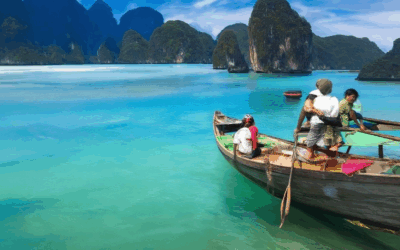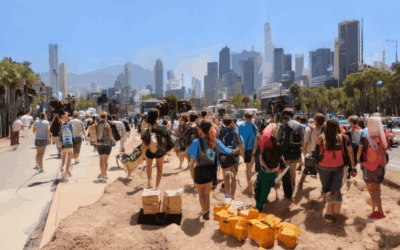Cultural immersion travel offers a unique opportunity to transcend borders and delve into the heart of foreign cultures, fostering a deeper understanding and appreciation of the world’s diverse customs, traditions, and ways of life. By embracing the concept of cultural immersion, travelers can break free from the confines of traditional tourism and embark on a transformative journey that not only broadens their horizons but also enriches their personal growth.

What is an Example of Cultural Immersion?
Cultural immersion is a profound way to connect with foreign cultures, fostering meaningful relationships and gaining valuable life experiences.
- Booking a homestay allows you to live with a local family, sharing meals and daily routines, and learning about their customs and traditions.
- Signing up for a traditional cooking class enables you to learn about local ingredients, cooking techniques, and recipes, while enjoying the fruits of your labor.
- Attending a religious ceremony provides insight into the spiritual practices and values of a particular culture, allowing you to appreciate its significance and beauty.
- Trekking a time-honored trail with a local guide offers a unique perspective on the region’s history, geography, and ecosystem, while promoting physical activity and adventure.
- Joining a fishing expedition or participating in a seasonal ritual allows you to engage with local communities, learn about their livelihoods, and develop a deeper appreciation for their way of life.
These experiences not only broaden your horizons but also challenge your assumptions, helping you grow as a person and become a more empathetic and open-minded individual.
At Inxchan, we believe that cultural immersion is a powerful tool for personal growth, cultural understanding, and global awareness.
We encourage our readers to embark on transformative journeys, exploring the world with purpose and passion.
Whether you’re looking to immerse yourself in a new culture or simply want to learn more about the world around you, we invite you to join us on this exciting journey of discovery and exploration.
Learn more about our travel and volunteer-focused blog, which shares stories, tips, and guides that emphasize personal growth, cultural understanding, and impactful travel.
Discover how you can contribute to global awareness through transformative journeys and meaningful connections with local communities.
Visit our website to explore our collection of articles, guides, and resources, designed to inspire and empower you to make a positive impact on the world.
Together, let’s create a more compassionate and connected world, one cultural immersion experience at a time.
What Does Cultural Immersion Mean?
Cultural immersion is the process of fully engaging with and participating in the customs, traditions, and daily life of a foreign culture.
- It involves immersing oneself in the local environment, interacting with locals, and learning about their way of life.
- This can be achieved through various means, such as living with a host family, attending local events, trying traditional foods, and practicing the local language.
Benefits of Cultural Immersion
Cultural immersion offers numerous benefits, including:
- Improved cross-cultural understanding and communication skills
- Increased empathy and tolerance towards different cultures
- Enhanced language skills and ability to navigate unfamiliar environments
- Better job prospects and career opportunities in international settings
Tips for Maximizing Cultural Immersion
To get the most out of cultural immersion, consider the following tips:
- Be open-minded and willing to learn about the local culture
- Engage with locals and participate in community activities
- Try new foods and drinks, and experiment with local cuisine
- Learn basic phrases in the local language and practice speaking with locals
Examples of Cultural Immersion Programs
Cultural immersion programs come in many forms, including:
- Study abroad programs that allow students to live and study in a foreign country
- Volunteer programs that enable individuals to work and live in a foreign community
- Cultural exchange programs that facilitate homestays and language exchange
Getting Started with Cultural Immersion
If you’re interested in experiencing cultural immersion, start by researching programs and opportunities that align with your interests and goals.
Consider factors such as cost, duration, and location, and look for programs that offer support and guidance throughout the process.
With careful planning and an open mind, you can embark on a rewarding cultural immersion experience that broadens your horizons and enriches your life.

What is Immersion Travel?
As someone who loves exploring global adventures with a purpose, I’ve come to realize that there’s more to traveling than just seeing sights – it’s about immersing yourself in the local culture, meeting incredible people, and making meaningful connections.
- Immersion travel, also known as experiential travel, is a type of tourism that focuses on actively engaging with a destination’s history, people, culture, food, and environment.
- This approach allows travelers to gain a deeper understanding of the local way of life, fostering empathy and appreciation for the communities they visit.
Key Elements of Immersion Travel
- Cultural Exchange: Engage with locals through homestays, language classes, or community-based projects to develop a genuine connection with the culture.
- Sustainable Tourism: Support eco-friendly initiatives, reduce waste, and respect the environment to minimize the impact of tourism on the destination.
- Participate in authentic activities, such as cooking classes, traditional festivals, or workshops, to truly immerse yourself in the local culture.
- Contribute to community development projects, conservation efforts, or social causes to give back to the places you visit.
Benefits of Immersion Travel
- Develop new skills, challenge your perspectives, and become a more empathetic and open-minded individual.
- Gain a deeper appreciation for diverse cultures, traditions, and ways of life, promoting cross-cultural understanding and tolerance.
- Build lasting relationships with locals, contributing to the well-being of the communities you visit.
- Support environmentally responsible tourism practices, reducing the negative effects of mass tourism on destinations.
Getting Started with Immersion Travel
To embark on an immersive travel journey, consider the following steps:
- Look for places that offer unique cultural experiences, sustainable tourism opportunities, and community engagement programs.
- Select tour operators that prioritize environmental sustainability, fair labor practices, and community involvement.
- Book accommodations, transportation, and activities in advance to ensure a smooth and enjoyable trip.
- Be willing to step out of your comfort zone, try new things, and adapt to unexpected situations.
Join the Immersion Travel Community
At Inxchan, we believe in the power of immersion travel to transform lives and foster global understanding. Join our community of like-minded travelers, share your experiences, and discover new destinations that align with your values.

What is the Meaning of Cultural Travel?
Cultural travel is a type of travel that focuses on immersing oneself in a foreign culture, going beyond the surface level of tourism.
- As a cultural traveler, I leave my comfort zone behind, embracing the unfamiliar and seeking to understand the local customs, traditions, and ways of life.
- I bring only myself and a willingness to learn, becoming a participant in the culture rather than just an observer.
The Benefits of Cultural Travel
Cultural travel offers numerous benefits, including:
- Deeper connections with locals and a greater sense of belonging
- A broader perspective on the world and its diverse cultures
- Personal growth through challenges and experiences
- Opportunities to develop new skills and interests
How to Practice Cultural Travel
To truly experience cultural travel, consider the following tips:
- Research and plan ahead to understand the local culture and customs
- Engage with locals and participate in community activities
- Be respectful and open-minded, avoiding stereotypes and assumptions
- Take time to reflect on your experiences and learn from them
Examples of Cultural Travel
Cultural travel can take many forms, including:
- Homestays and family visits
- Cultural festivals and events
- Language immersion programs
- Volunteer work and community service
Getting Started with Cultural Travel
If you’re interested in exploring cultural travel, start by:
- Identifying your goals and motivations
- Researching destinations and opportunities
- Connecting with others who share your interests
- Being patient and flexible, as cultural travel often requires adaptability
Cultural Immersion Traveling
Cultural immersion is a unique and enriching way to travel, allowing you to integrate yourself into another culture, live among locals, and gain a deeper understanding of their customs and traditions.
- Benefits of Cultural Immersion Traveling
- Develop a deeper appreciation for local cultures and ways of life
- Improve communication skills through interaction with locals
- Gain valuable life experiences and perspectives
- Support local communities and economies
- Types of Cultural Immersion Experiences
- Homestays: Live with local families and participate in daily activities
- Volunteer programs: Contribute to local projects and initiatives
- Languages courses: Learn local languages and dialects
- Cooking classes: Discover traditional cuisine and cooking techniques
- Popular Destinations for Cultural Immersion Traveling
- Japan: Experience vibrant cities, ancient temples, and traditional festivals
- India: Explore colorful markets, rich history, and diverse cultures
- Mexico: Visit ancient ruins, try delicious street food, and enjoy lively music
- Thailand: Relax on beautiful beaches, learn about Buddhism, and indulge in spicy cuisine
- Tips for Successful Cultural Immersion Traveling
- Be respectful of local customs and traditions
- Learn a few basic phrases in the local language
- Stay open-minded and curious
- Engage with locals and ask questions
By embracing cultural immersion traveling, you can have a more meaningful and memorable travel experience, connecting with people and places in a way that goes beyond mere sightseeing.

Understanding the Different Types of Cultural Tourists
I’ve traveled extensively and volunteered abroad, and I can attest that there are various types of cultural tourists.
- The Mass Tourist
- The Independent Tourist
- The Adventure Tourist
- The Eco-Tourist
- The Volunteer Tourist
This type of tourist typically visits popular destinations, often following a set itinerary and staying in large groups. They may not immerse themselves deeply in local culture, preferring to stick to what’s familiar.
Independent tourists prefer to plan their own trips, often choosing off-the-beaten-path destinations and accommodations. They tend to engage more with local cultures, trying new foods and activities.
Adventure tourists seek out thrilling experiences, such as hiking, rock climbing, or scuba diving. They often visit remote areas and participate in outdoor activities that allow them to connect with nature.
Eco-tourists prioritize environmental sustainability and conservation. They choose tour operators that adhere to eco-friendly practices and support local communities in preserving natural habitats.
Volunteer tourists combine travel with volunteering, often working on projects that benefit local communities. This type of tourism promotes cross-cultural understanding and supports sustainable development.
In my experience, cultural tourism has been incredibly rewarding, allowing me to connect with people from diverse backgrounds and learn about their customs and traditions.
Conclusion:
Cultural tourism offers a unique opportunity to engage with local cultures, promote cross-cultural understanding, and support sustainable development. By recognizing the different types of cultural tourists, we can better appreciate the complexities of this phenomenon and work towards creating a more inclusive and responsible tourism industry.




0 Comments